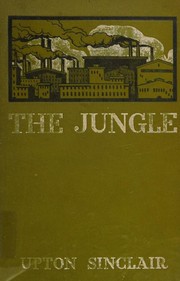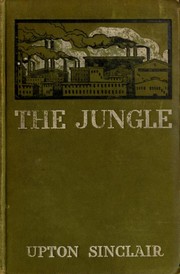The Jungle Publish date: 1906Author: Subjects: Slaughtering and slaughter-houses, Sociology, Lithuanian Americans, Fiction, Historical Fiction, Emigration and immigration, Packing-houses, Stockyards, Meat industry and trade, Corrupt practices, Open Library Staff Picks, Classic Literature, Working class, Political corruption, Beef industry, Immigrants, Meat industry, Capitalism, Trade unions, Lithuanians in the United States, History, Factories, Law and legislation, Slaughtering and slaughterhouses, Corruption (in politics), Spanish language, Nonfiction, Social conditions, Politics, American fiction (fictional works by one author), Chicago (ill.), fiction, Illinois, fiction, Fiction, political, Fiction, general, Lithuania, fiction, Fiction, history and criticism, 20th century, Literature, German, Dictionaries, English language, French, General, Chinese, Korean, Spanish, Political fiction, Labor laws and legislation, Labor supply, Social problems, Lithuanians, Fiction, historical, general, United states, fiction, American literature, Marchés aux bestiaux, Romans, nouvelles, Travailleurs, Américains d'origine lituanienne, Sinclair, upton, 1878-1968, Children's fiction, Working class, fiction, Comic books, strips, COMICS & GRAPHIC NOVELS / Historical Fiction, COMICS & GRAPHIC NOVELS / Adaptations, Graphic novels, Bolivia, description and travel, Lithuanian americans--comic books, strips, etc, Working class--comic books, strips, etc, Meat industry and trade--comic books, strips, etc, Stockyards--comic books, strips, etc, Immigrants--comic books, strips, etc, Pn6790.g43 g44 2019, 741.5/943, Long Now Manual for Civilization, Usines, Synapses, Neurons, Physiology, Brain Characters: Upton Sinclair (1878-1968) Places: Chicago (Ill.), Illinois, Chicago, United States Period: 1865-1918 Editions: Number of pages: 413Rating: 4.0/5Votes: 66Buy: Links: Wikipedia, VIAF ID: 174237116, inventaire.io Overview: Upton Sinclair's dramatic and deeply moving story exposed the brutal conditions in the Chicago stockyards at the turn of the nineteenth century and brought into sharp moral focus the appalling odds against which immigrants and other working people struggled for their share of the American dream. Denounced by the conservative press as an un-American libel on the meatpacking industry, the book was championed by more progressive thinkers, including then President Theodore Roosevelt, and was a major catalyst to the passing of the Pure Food and Meat Inspection act, which has tremendous impact to this day.




















